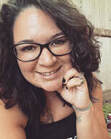 By Ereka Howard According to Dictionary.com, identity is defined as the state or fact of remaining the same one or ones, under varying aspects or conditions. I spent two years in foster care and then was adopted as a toddler. As a child growing up in a predominantly African American family, one reason I struggled with identity was due to not looking like the family that adopted me. When I was younger, I remember looking at my parents and thinking maybe they really were my biological parents and just didn't want to tell me. Maybe a swan brought me in and dropped me off at their door.
0 Comments
 by Hannah Andrews It took me a while to warm up to this month’s theme, “Loving Ourselves.” I didn’t feel qualified to write about “self-love.” My cup has never runneth over with self-confidence. I think the adopted kid in me built an inner narrative. After all, if my own mother, the one who was supposed to love me the most, gave me away, what real value could I have? I’m sure some schoolyard bullies reinforced this belief in me, but I definitely had my own inner bully. I learned to live with the highs and lows throughout my life, though that’s an understatement. My highs never seemed that high and my lows were excruciating.  by D. Scott Cooper, Adopted Person One day as a toddler, I saw myself in a car bumper. I was surprised to see how dark my reflection was that Summer. My skin was dark brown, but my sister called it tan. Thank God I became a good athlete, cause that gave me worth with man. Then the College days behind me now, where I felt so in between. I thought that I was hiding, but my dark skin was clearly seen. Now I run the race, like a boxer beats the air, just hoping there’s a finish line to find some solace there. So many years have passed since I stared at my reflection, I’ve almost now forgotten how deep was my deception. These days my hair’s much straighter, and my color almost passes, but now after all these years, I don’t care to please the White masses. Thank God I no longer look at that dark face in the mirror, and wish the person looking back were really not here. AKA invites you to hear from members of the extended family of adoption and the surrounding community. While we take great care in curating the content, please know:
 By Liz DeBetta, Ph.D. It’s the beginning of a new year. A new opportunity to go deeper with myself, with others, and learn more about the complexity of my experience as an adopted person. I am never not adopted. It’s a condition of my existence that will never not be true and it makes every relationship I am part of infinitely more complex. Including the ones I have with my family; with both my families.  By Shannon Quist We have our little talks every two weeks or so, assuming one of us doesn’t cancel the meeting invite or move it to accommodate what is for both of us, a busy work schedule. We do our work in the background, sometimes, but most of the time we just talk. She needs it, I need it. Though she is much more than this, the easiest way I can introduce you to my friend is to say that she is a warm and spirited mentor to me and she is an adoptive mother to a former foster child. Her child and my own are a couple of years apart so we chat about them sometimes in that way, but when she needs to, I also allow her to pick my brain on my own childhood experiences because I am an adoptee. Like all adoption stories vary, mine differs from the one her child lives, but there are pieces that ring true for all of us despite those differences, and that’s what my friend usually looks for when she is struggling with something. Hopefully, you know by now that adoption is never easy and always complicated. We live it. And talking helps sometimes. One day, after I told her about my birth mother’s birthday and my weird mood, she asked me, tentatively, “Is there some small part of you that is thankful? Grateful?” And I let myself recoil then explained why I hated that question. But then, because she deserves my honesty, I continued on to answer it. I’m writing this now to share with you because it’s such a common question, but also because the only way to ask or answer this question is to be delicate. I don’t like being asked if I’m grateful. This question automatically centers the story on my adoptive parents. The inquiry is actually: Do you realize how much sacrifice and trouble your parents went to in order to bring you home and raise you? Are you thankful for the rescue? Are you grateful for the change in your situation (socioeconomically)? This question also glosses over the nuances and complexity of my situation and only inquires about the positivity that can be found in my adoption story. But you can’t have blooming flowers without rain. Finally, being asked about my gratefulness insinuates a “should” social standard and demands a performance of it. It says, “You should be grateful. Show me how you’re grateful.” But to answer the question, yes. I am grateful, but that’s not all I am. |
Back to Main BlogNewsletter ArchivesBlog Archive
April 2024
Categories |
 RSS Feed
RSS Feed